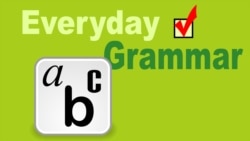Imagine that you are at a restaurant for breakfast. You want something to drink, but you are not sure what. When the server walks over to your table, he says:
Let me help. Do you prefer coffee or tea?
You answer:
I prefer tea to coffee.
You just told the server about a general preference. The server then makes a few suggestions about the teas available.
When we are given choices, there are special phrases we use to say which thing we like more than another. We call these choices “preferences.”
In our program today, we will show you how to use general and specific preferences. We have different phrases for each.
General Preferences
To begin, let's look at general preferences.
A general preference is something you like more as a whole. It is not tied to a specific event or time. It is simply a fact about your likes. For example, you probably like one style of music more than another style. And, you like one kind of food more than another food.
Phrases we usually use for general preferences are “prefer” and “like better.” They have the same meaning.
Prefer…
Let’s talk about the word “prefer” and hear the coffee and tea example again:
Do you prefer coffee or tea?
Notice that the word “or” is used in the question form. In the answer, we use the preposition “to” or “over.”
I prefer tea to coffee.
I prefer tea over coffee.
As you might know, in English, when we answer a question, we do not usually answer with full wording. If asked about a preference, you can simply name the preference, like this:
I prefer tea.
Here is another example of a question and answer:
Do you prefer living in the city or the suburbs?
I prefer living in the city.
In American English, “prefer” is a little more formal but still common enough to use in everyday speech.
Like better…
But Americans are more likely to use the phrase “like…better” when talking with others. We use the word “than” after this phrase. Here is how we do that in a question and answer:
Do you like tea or coffee better?
I like tea better than coffee.
Again, when answering, we usually only name the preference:
I like tea better.
Here is another example of a question and answer:
Do you like living in the city or the suburbs better?
I like living in the city better.
Notice that, in question form, the word “better” comes at the end of the question.
Specific Preferences
Now, let’s turn to specific preferences.
A specific preference is something you like or want more at a given point in time, either right now or in the future.
We use the expressions “would prefer” and “would rather” to talk about such things. These phrases have the same meaning.
Would rather…
Let’s look at the phrase “would rather.” It is much more common in American spoken English than “would prefer.”
For both phrases, we almost always use the short form of the word “would” with a personal pronoun. We call the shortened form a “contraction.” For example, the contraction of “I would” is “I’d.” When "would" is contracted, it looks and sounds just like the letter “d.”
Listen to the normal form and the contraction of “would rather.” With “would rather,” we use the word “than” in the response.
Would you rather go out or stay home?
I would rather go out than stay home.
I’d rather go out than stay home.
Again, we usually only name the preference in responses.
I’d rather go out.
And, if there is only one main verb after “would rather,” we do not say it two times. Here is an example:
Would they rather study French or English?
And the answer:
They’d rather study English.
Notice that the verbs “go,” “stay” and “study” are in simple form – the basic form without “to” before it or any letters at the end. After “would rather,” we always use the simple form of verbs.
Would prefer…
Just like “would rather,” we can use “would prefer” to talk about specific preferences. But, to Americans, “would prefer” sounds more formal and we do not use it often in speaking. Here is an example of a question and answer:
Would you prefer to go out or stay home?
I’d prefer to go out.
Note that, when Americans do use “would prefer,” we usually only name the preference, as in the example.
However, when the answer mentions both choices, Americans usually say it this way:
I’d prefer to go out than stay home.
The sounds of “would”
It may take time for you to become comfortable with the sounds of the contraction of “would” with personal pronouns. It helps to pay attention to what comes after the d sound. If you hear the word “rather” or “prefer” afterward, then you know someone is telling you about a preference.
And, I could say a lot more on this subject, but I’d rather end it here!
I’m Alice Bryant.
Alice Bryant wrote this story for Learning English. George Grow was the editor.
What are some types of foods, music and other things that you prefer? Write to us in the Comments. We would love to hear from you.
_____________________________________________________________
Words in This Story
prefer – v. to like someone or something better than someone or something else
phrase – n. a group of two or more words that express a single idea but do not usually form a complete sentence
style – n. a way in which something is done, created, or performed
suburb – n. a town or other area where people live in houses near a larger city
formal – adj. suitable for serious or official speech and writing
comfortable – adj. causing no worries, difficulty, or uncertainty
mention – v. to talk about, write about, or refer to in a brief way





